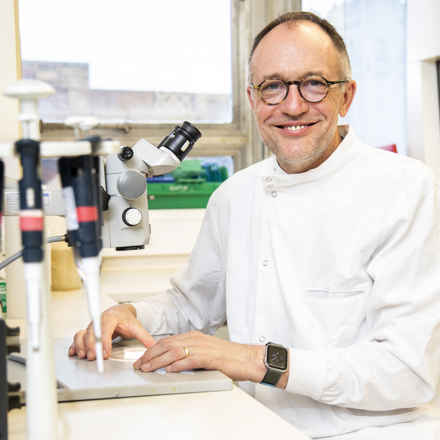New research projects to stop early AMD and treat macular dystrophies
Posted: Thursday 30 September 2021
Everything we learn about macular disease brings us closer to beating it for good. Thanks to Macular Society members and supporters, seven new research projects will start this year – each one bringing a cure closer, or making life better today.
Here we explore just two of the projects our members have made it possible to fund this year.
Our researchers tell us more about their latest work on stopping early age-related macular degeneration (AMD) and macular dystrophies.
Andrew Dick, from the University of Bristol tells us more about his project Healthy mitochondria, better sight: stopping early AMD by helping eye cells to use energy better
What is the problem?
Cells in the retinal pigment epithelium (RPE) use a lot of energy, so they are vulnerable to the build-up of toxic waste and damage to mitochondria (the cells’ energy sources).
This triggers the immune system and causes inflammation, which is even more damaging.
We have discovered that loss of critical molecules including IL-33 disrupts cell metabolism: the way cells use energy. This causes cell ageing and harmful inflammation, of the kind we’d expect to see in age-related macular degeneration (AMD).
The project
We want to use this discovery of key molecules to reset RPE health and stop AMD at its very earliest stages.
We will start by introducing molecules into stressed cells and using genetic profiling to understand how this treatment could help the RPE to work better. In the second stage, we will explore how best to deliver these potential therapies, aiming to stop or delay the damaging changes.
Why is this important?
Our project seeks to understand how the immune system and metabolic changes work together to make AMD worse. That understanding could lead to a targeted therapy to treat AMD early, efficiently and safely.
Our second project is taking place at the University of Manchester.
Dr Jamie Ellingford explains more about The Manchester Eye Tissue Repository Genome- Transcriptome Project.
What is the problem?
Macular dystrophies (MDs) are genetic conditions that can cause problems with detailed vision from early childhood. Although we know most of the genes that cause MDs, many individuals do not have a diagnosis, even after extensive genetic testing.
The project
We will use donated human tissue from the Manchester Eye Tissue Repository to identify common and rare gene changes that impact the expression of genes in the retina – whether the genes are ‘switched on’ or not, and how active they are.
Why is this important?
One immediate benefit will be improved interpretation of gene changes that sometimes cause (and sometimes do not cause) MD. This will mean more people get a genetic diagnosis, and are able to manage their condition better. Understanding how MDs develop and progress could also suggest new ways to treat them.
Find out more about our research programme or sign up to join our Research Participant Database, for a chance to be a part of future clinical trials.
